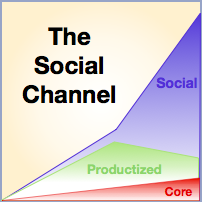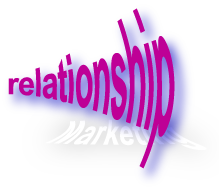Social Channel Two: Understanding the Social Channel of Value by Examining Its Precedents
 Meet the Social Channel of Value, the new arena where brands compete for user (customer, client) attention and loyalty. Product features are losing their ability to differentiate because they are copied so easily. Moreover, the Social Channel of Value will transform human decision-making, organizations and institutions because it digitizes sociality, a core human trait, and its power will dwarf the power of the product and the brand. CEOs, CMOs and CPOs have a very rare social business opportunity to harness the Social Channel ahead of competitors and remake their markets. These are strong statements, but bear with me and I think you’ll appreciate why I’ve made them. Meet the Social Channel of Value, the new arena where brands compete for user (customer, client) attention and loyalty. Product features are losing their ability to differentiate because they are copied so easily. Moreover, the Social Channel of Value will transform human decision-making, organizations and institutions because it digitizes sociality, a core human trait, and its power will dwarf the power of the product and the brand. CEOs, CMOs and CPOs have a very rare social business opportunity to harness the Social Channel ahead of competitors and remake their markets. These are strong statements, but bear with me and I think you’ll appreciate why I’ve made them.
The Social Channel is the Knowledge Economy‘s analog to the Industrial Economy’s assembly line, which led to today’s brands and mass-produced products. Where the assembly line made fabrication ten times more efficient, digital social technologies will boost human communication and sociality by an order of magnitude. The “Social Channel of Value” shows how product and service features will […]
Social Channel One: Building Post-Product Relationships with Customers is how to Build Brands
 Pioneering brands are building post-product customer relationships in the social channel because they realize that product features are copied easily and serve as weak differentiators, which leads to pervasive commoditization. Moreover, people’s preferences for individualized information dealt mass media a lethal blow, and products firms will have a similar fate. Here’s why products will become extinct and how to guide your brand in building post-product customer relationships and profits. Pioneering brands are building post-product customer relationships in the social channel because they realize that product features are copied easily and serve as weak differentiators, which leads to pervasive commoditization. Moreover, people’s preferences for individualized information dealt mass media a lethal blow, and products firms will have a similar fate. Here’s why products will become extinct and how to guide your brand in building post-product customer relationships and profits.
I have predicted for years that mass customization would be the fate of “products,” and social business is bearing this out in spades, so here I’ll delve into how impersonal “products” will be rejected by customers in 5-15 years. More important, CMOs and brand stewards who appreciate this transformation will enjoy unusual advantage, and smart ones will prepare for it now. Brands that don’t get it will simply perish, and no one will even notice except their producers and vendors. Just think about the local papers and TV stations you have known.
This is Part One […]
Nonprofits’ and NGOs’ use of street marketing and social media reveals how mission too often overshadows relationship building—and alienates more people than it attracts.
 In How Nonprofits & NGOs Can Press Their Home Court Advantage in Social Business, I explained how nonprofits had a significant “moral advantage” over commercial enterprises because they were cause-focused, which is inherently more attractive to most people than business focus. However, as I’ll explain here, too many NFPs apply their moral advantage in the wrong way, so it creates more negative than positive impressions. I’ll use the tangible example of street marketing to make the point before applying it to social business/social media. In How Nonprofits & NGOs Can Press Their Home Court Advantage in Social Business, I explained how nonprofits had a significant “moral advantage” over commercial enterprises because they were cause-focused, which is inherently more attractive to most people than business focus. However, as I’ll explain here, too many NFPs apply their moral advantage in the wrong way, so it creates more negative than positive impressions. I’ll use the tangible example of street marketing to make the point before applying it to social business/social media.
[…]
Upgrading the Expert Role for the Knowledge Economy shows how knowledge workers can no longer seek refuge in their core expertise, and how to branch out.

“Experts” are regarded as the foremost authorities in their fields, the glib guru versions notwithstanding. An oft quoted maxim shows why: according to Malcolm Gladwell, for one, it takes 10,000 hours [of study, work] for most people to become expert in something.* On a related front, Naveen Jain posits that experts will be less likely to solve today’s toughest problems because their expertise has become a box around them. All those degrees or promotions within the organization have focused their minds but also closed out creativity. While commenting on his post, I realized that redefining the expert would be necessary in the Knowledge Economy, so here I’ll offer some strategies and tactics for how to practice being an “expert” in the 21st century.
Notably, we can take lessons from experts and apply them to specialists, which are arguably less far along on the same vector—and more common.
[…]
 I have written often about various facets of social business disruption, which usually causes organizations angst because they have to learn to change how they do things. On a happier note, nonprofits and NGOs, long accustomed to being (relatively) disadvantaged do-gooders grateful for commercial bodies’ largesse, actually have more of an advantage in social business than commercial firms (“brands”). I have written often about various facets of social business disruption, which usually causes organizations angst because they have to learn to change how they do things. On a happier note, nonprofits and NGOs, long accustomed to being (relatively) disadvantaged do-gooders grateful for commercial bodies’ largesse, actually have more of an advantage in social business than commercial firms (“brands”).
In this context, government usually lies between nonprofits and brands because it’s not commercially focused (advantage), but it rarely considers individuals in meaningful ways (disadvantage). Here I’ll lay out the rationale for these claims before giving some practical pointers for unlocking social business potential by understanding the social good of your business. Brands and governments, you can learn from this, too.
[…]
 The power of specialization in social networks explains how most executives and knowledge workers are not yet in synch with the emerging Knowledge Economy and its disruption of career assumptions. One of the most powerful career beliefs of the 20th century is especially out of place in the 21st century: generalists are more flexible and employable. Read on for a brief explanation of key Knowledge Economy career trends and specific action steps you can take to expand opportunity for yourself, your colleagues and your family. The power of specialization in social networks explains how most executives and knowledge workers are not yet in synch with the emerging Knowledge Economy and its disruption of career assumptions. One of the most powerful career beliefs of the 20th century is especially out of place in the 21st century: generalists are more flexible and employable. Read on for a brief explanation of key Knowledge Economy career trends and specific action steps you can take to expand opportunity for yourself, your colleagues and your family.
[…]
 Fear Is B2B Sales’ Unusual Trust and Relationship Accelerator when salespeople know how to understand it and earn trust through empathy. Fear Is B2B Sales’ Unusual Trust and Relationship Accelerator when salespeople know how to understand it and earn trust through empathy.
Having been in management consulting for over 25 years, I agree with Charles H. Green that fear is the core driver of organizations’ and negotiation partners’ “difficult” behavior—and that it offers B2B providers a reliable opportunity to outmaneuver competitors by building trust where they can’t. As usual, he is right on the money in Find the Fear and Swim Upstream to Trust: “Fear is the main driver of … passive aggressive, secretive, avoiding, combative, resentful, backstabbing, gossiping [behavior]…”
But fear can be a gold mine. In my experience, fearful clients or prospects are afraid of a personal or organizational situation, not you. Therefore, their fear and “difficult” behavior is a barrier to all potential providers, which can be your opportunity: by working with the client/prospect to mitigate the root cause, you can develop a high level of trust quickly. Moreover, fear tends to be contagious, and most people, including competitors, avoid it, which […]
 Based on numerous executive conversations I’ve had over the past few months, I’m struck by the staying power of 20th century “communications” rules, which still govern many brands today. Therefore, I’ll reveal hidden assumptions that lurk in too many boardrooms in the desire that you root them out before your rivals, so you can outmaneuver them before they disrupt you. Based on numerous executive conversations I’ve had over the past few months, I’m struck by the staying power of 20th century “communications” rules, which still govern many brands today. Therefore, I’ll reveal hidden assumptions that lurk in too many boardrooms in the desire that you root them out before your rivals, so you can outmaneuver them before they disrupt you.
20th century success formulas offer very thin ice on which to skate, and many brands will have a cold awakening. Periods of disruption make assumptions lethal because disruptions change past rules or invalidate them completely, which leads executives and brand stewards astray. In this brief treatement of a complex subject, I’ll show why executives unwittingly sabotage social business’s network-based communications by using mass communications principles.
[…]
 In An Offer You Can’t Refuse, Lydia Dishman interviews CEO Justin Moore, who discusses his business leadership “lessons learned” from watching The Godfather. It’s a solid post, but very thoughtful and insightful comments take it into classic territory. That said, the post didn’t hit the bullseye for our context here—B2B relationship building—so here goes with the pieces I think it missed. I invite you to add yours in comments. In An Offer You Can’t Refuse, Lydia Dishman interviews CEO Justin Moore, who discusses his business leadership “lessons learned” from watching The Godfather. It’s a solid post, but very thoughtful and insightful comments take it into classic territory. That said, the post didn’t hit the bullseye for our context here—B2B relationship building—so here goes with the pieces I think it missed. I invite you to add yours in comments.
[…]
 In Why Lie?, Seth Godin points out that prospects of (B2B) salespeople often lie because they do not want their decisions to be questioned by salespeople: “… when we announce that we’ve made the decision to hire someone else, or when we tell the pitching entrepreneur we don’t like her business model, or when we clearly articulate why we’re not going to do business, the salesperson responds by questioning the judgment of the prospect.” In Why Lie?, Seth Godin points out that prospects of (B2B) salespeople often lie because they do not want their decisions to be questioned by salespeople: “… when we announce that we’ve made the decision to hire someone else, or when we tell the pitching entrepreneur we don’t like her business model, or when we clearly articulate why we’re not going to do business, the salesperson responds by questioning the judgment of the prospect.”
Great insight, but it pre-supposes a lack of trust that is totally outdated and unnecessary. Let’s review how this comes about and how to disrupt the whole cycle.
[…]
|
|
 Meet the Social Channel of Value, the new arena where brands compete for user (customer, client) attention and loyalty. Product features are losing their ability to differentiate because they are copied so easily. Moreover, the Social Channel of Value will transform human decision-making, organizations and institutions because it digitizes sociality, a core human trait, and its power will dwarf the power of the product and the brand. CEOs, CMOs and CPOs have a very rare social business opportunity to harness the Social Channel ahead of competitors and remake their markets. These are strong statements, but bear with me and I think you’ll appreciate why I’ve made them.
Meet the Social Channel of Value, the new arena where brands compete for user (customer, client) attention and loyalty. Product features are losing their ability to differentiate because they are copied so easily. Moreover, the Social Channel of Value will transform human decision-making, organizations and institutions because it digitizes sociality, a core human trait, and its power will dwarf the power of the product and the brand. CEOs, CMOs and CPOs have a very rare social business opportunity to harness the Social Channel ahead of competitors and remake their markets. These are strong statements, but bear with me and I think you’ll appreciate why I’ve made them.
 In How Nonprofits & NGOs Can Press Their Home Court Advantage in Social Business, I explained how nonprofits had a significant “moral advantage” over commercial enterprises because they were cause-focused, which is inherently more attractive to most people than business focus. However, as I’ll explain here, too many NFPs apply their moral advantage in the wrong way, so it creates more negative than positive impressions. I’ll use the tangible example of street marketing to make the point before applying it to social business/social media.
In How Nonprofits & NGOs Can Press Their Home Court Advantage in Social Business, I explained how nonprofits had a significant “moral advantage” over commercial enterprises because they were cause-focused, which is inherently more attractive to most people than business focus. However, as I’ll explain here, too many NFPs apply their moral advantage in the wrong way, so it creates more negative than positive impressions. I’ll use the tangible example of street marketing to make the point before applying it to social business/social media.
 I have written often about various facets of social business disruption, which usually causes organizations angst because they have to learn to change how they do things. On a happier note, nonprofits and NGOs, long accustomed to being (relatively) disadvantaged do-gooders grateful for commercial bodies’ largesse, actually have more of an advantage in social business than commercial firms (“brands”).
I have written often about various facets of social business disruption, which usually causes organizations angst because they have to learn to change how they do things. On a happier note, nonprofits and NGOs, long accustomed to being (relatively) disadvantaged do-gooders grateful for commercial bodies’ largesse, actually have more of an advantage in social business than commercial firms (“brands”). The power of specialization in social networks explains how most executives and knowledge workers are not yet in synch with the emerging Knowledge Economy and its disruption of career assumptions. One of the most powerful career beliefs of the 20th century is especially out of place in the 21st century: generalists are more flexible and employable. Read on for a brief explanation of key Knowledge Economy career trends and specific action steps you can take to expand opportunity for yourself, your colleagues and your family.
The power of specialization in social networks explains how most executives and knowledge workers are not yet in synch with the emerging Knowledge Economy and its disruption of career assumptions. One of the most powerful career beliefs of the 20th century is especially out of place in the 21st century: generalists are more flexible and employable. Read on for a brief explanation of key Knowledge Economy career trends and specific action steps you can take to expand opportunity for yourself, your colleagues and your family. Fear Is B2B Sales’ Unusual Trust and Relationship Accelerator when salespeople know how to understand it and earn trust through empathy.
Fear Is B2B Sales’ Unusual Trust and Relationship Accelerator when salespeople know how to understand it and earn trust through empathy. Based on numerous executive conversations I’ve had over the past few months, I’m struck by the staying power of 20th century “communications” rules, which still govern many brands today. Therefore, I’ll reveal hidden assumptions that lurk in too many boardrooms in the desire that you root them out before your rivals, so you can outmaneuver them before they disrupt you.
Based on numerous executive conversations I’ve had over the past few months, I’m struck by the staying power of 20th century “communications” rules, which still govern many brands today. Therefore, I’ll reveal hidden assumptions that lurk in too many boardrooms in the desire that you root them out before your rivals, so you can outmaneuver them before they disrupt you.